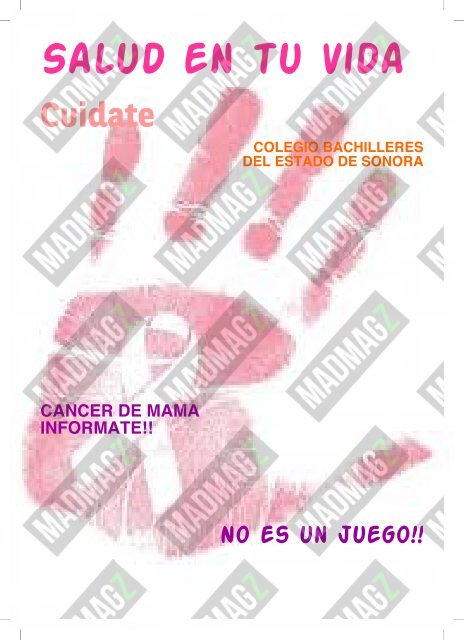You also want an ePaper? Increase the reach of your titles
YUMPU automatically turns print PDFs into web optimized ePapers that Google loves.
Salud en tu vida<br />
Cuidate<br />
COLEGIO BACHILLERES<br />
DEL ESTADO DE SONORA<br />
CANCER DE MAMA<br />
INFORMATE!!<br />
No es un juego!!
<strong>Cáncer</strong> <strong>de</strong> <strong>mama</strong><br />
¿Que es?<br />
El cancer <strong>de</strong><br />
<strong>mama</strong> aparece<br />
cuando las<br />
celulas <strong>de</strong>l<br />
epitelio<br />
glandular se<br />
repro<strong>de</strong>cen <strong>de</strong><br />
forma<br />
incontrolada y<br />
muy<br />
rapidamente.<br />
El cancer <strong>de</strong> <strong>mama</strong> es el que<br />
comienza en los tejidos<br />
<strong>mama</strong>rios y existen dos tipos:<br />
*El carcinoma ductal<br />
*El carcinomalobulillar<br />
Plantel villa <strong>de</strong> seris
Causas <strong>de</strong>l cáncer <strong>de</strong> <strong>mama</strong><br />
Edad y sexo: El<br />
riesgo <strong>de</strong> pa<strong>de</strong>cer<br />
cáncer <strong>de</strong> <strong>mama</strong><br />
aumenta a medida<br />
que la persona<br />
envejece. La mayoría<br />
<strong>de</strong> los casos <strong>de</strong> cáncer<br />
<strong>de</strong> <strong>mama</strong> avanzado se<br />
encuentra en mujeres<br />
<strong>de</strong> más <strong>de</strong> 50 años.<br />
Antece<strong>de</strong>ntes<br />
familiares: La<br />
persona tiene un<br />
riesgo más alto <strong>de</strong><br />
pa<strong>de</strong>cer cáncer <strong>de</strong><br />
<strong>mama</strong> si tiene un<br />
familiar cercano que<br />
haya pa<strong>de</strong>cido este<br />
tipo <strong>de</strong> cáncer o algun<br />
otro tipo.<br />
Plantel villa <strong>de</strong> seris
Genes: Los <strong>de</strong>fectos<br />
en genes más<br />
comunes se<br />
encuentran en los<br />
genes BRCA1 y<br />
BRCA2. Estos genes<br />
normalmente<br />
producen proteínas<br />
que protegen a la<br />
persona <strong>de</strong>l cáncer. Si<br />
uno <strong>de</strong> los padres le<br />
transmite un gen<br />
<strong>de</strong>fectuoso, tendrá un<br />
mayor riesgo <strong>de</strong><br />
presentar cáncer <strong>de</strong><br />
<strong>mama</strong>.<br />
Ciclo menstrual:<br />
Las mujeres que<br />
iniciaron<br />
tempranamente sus<br />
períodos menstruales<br />
(antes <strong>de</strong> los 12 años)<br />
o llegaron a la<br />
menopausia tar<strong>de</strong><br />
(<strong>de</strong>spués <strong>de</strong> los 55)<br />
tienen un riesgo<br />
mayor <strong>de</strong> cáncer <strong>de</strong><br />
<strong>mama</strong>.<br />
Consumo <strong>de</strong><br />
alcohol: El consumo<br />
<strong>de</strong> más <strong>de</strong> 1 o 2 vasos<br />
<strong>de</strong> alcohol al día<br />
pue<strong>de</strong> incrementar el<br />
riesgo <strong>de</strong> cáncer <strong>de</strong><br />
<strong>mama</strong>.<br />
Plantel villa <strong>de</strong> seris
Parto: Las mujeres<br />
que nunca han tenido<br />
hijos o que los<br />
tuvieron recién<br />
<strong>de</strong>spués <strong>de</strong> los 30<br />
años tienen un mayor<br />
riesgo <strong>de</strong> presentar<br />
cáncer <strong>de</strong> <strong>mama</strong>.<br />
Hormonoterapia:<br />
la persona tiene<br />
mayor riesgo <strong>de</strong><br />
cáncer <strong>de</strong> <strong>mama</strong> si ha<br />
recibido<br />
hormonoterapia con<br />
estrógenos durante<br />
algunos años.<br />
Plantel villa <strong>de</strong> seris<br />
Obesidad: Ha estado<br />
asociada con el cáncer<br />
<strong>de</strong> <strong>mama</strong>, aunque este<br />
vínculo no se ha<br />
comprendido por<br />
completo. Los<br />
expertos piensan que<br />
las mujeres obesas<br />
producen más<br />
estrógenos, lo cual<br />
pue<strong>de</strong> estimular la<br />
aparición <strong>de</strong> este<br />
cáncer.<br />
Radiación: Si la<br />
persona recibió<br />
radioterapia cuando<br />
era niño o adulto<br />
joven para tratar un<br />
cáncer <strong>de</strong>l área <strong>de</strong>l<br />
tórax, tiene un riesgo<br />
muy alto <strong>de</strong> pa<strong>de</strong>cer<br />
cáncer <strong>de</strong> <strong>mama</strong>.
Pruebas y<br />
Examenes<br />
El médico le<br />
preguntará<br />
acerca <strong>de</strong> sus<br />
síntomas y<br />
factores <strong>de</strong><br />
riesgo y luego<br />
llevará a cabo<br />
un examen<br />
físico, el cual<br />
incluye ambas<br />
<strong>mama</strong>s, las<br />
axilas y el área<br />
<strong>de</strong>l cuello y <strong>de</strong>l<br />
tórax. Se alienta<br />
a las mujeres a<br />
realizar el<br />
autoexamen <strong>de</strong><br />
<strong>mama</strong>s cada<br />
mes. Sin<br />
embargo, la<br />
importancia <strong>de</strong><br />
la autoexámenes<br />
para<br />
<strong>de</strong>tectar el<br />
cáncer <strong>de</strong><br />
<strong>mama</strong> es<br />
discutible.<br />
Los exámenes utilizados<br />
para diagnosticar el cáncer<br />
<strong>de</strong> <strong>mama</strong> abarcan:<br />
*Resonancia magnética <strong>de</strong> las<br />
<strong>mama</strong>s.<br />
*Ecografía <strong>de</strong> las <strong>mama</strong>s<br />
*Biopsia <strong>de</strong> <strong>mama</strong><br />
*Tomografía computarizada<br />
*Mamografía<br />
*Tomografía por emisión <strong>de</strong><br />
positrones (TEP)<br />
*Biopsia <strong>de</strong> ganglio linfático<br />
centinela<br />
Plantel villa <strong>de</strong> seris
Tocate<br />
No es un juego!!<br />
Acu<strong>de</strong> con tu medio<br />
<strong>de</strong> cabecera cuanto<br />
antes, autoanalizate!<br />
COLEGIO<br />
BACHILLERES DEL<br />
ESTADO DE SONORA<br />
PLANTEL VILLA DE<br />
SERIS<br />
CREDITOS:<br />
FABIAN DE JESUS<br />
DUARTE NORIEGA<br />
Plantel villa <strong>de</strong> seris<br />
123456



